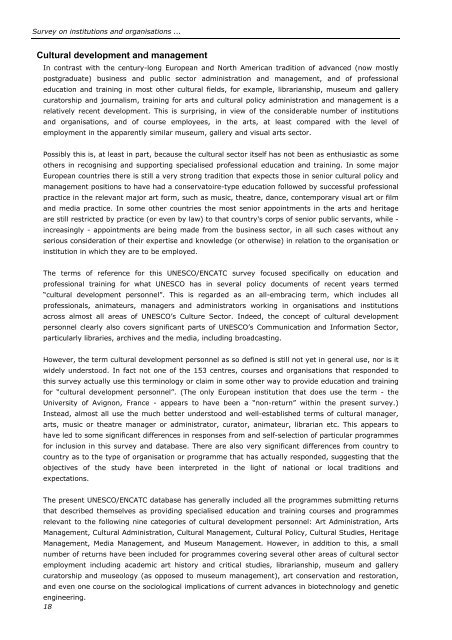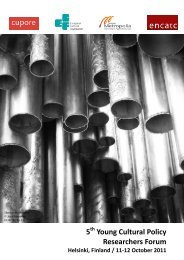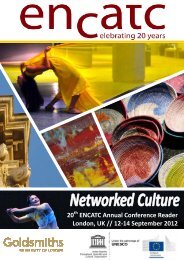Training in cultural policy and management: international ... - Encatc
Training in cultural policy and management: international ... - Encatc
Training in cultural policy and management: international ... - Encatc
You also want an ePaper? Increase the reach of your titles
YUMPU automatically turns print PDFs into web optimized ePapers that Google loves.
Survey on <strong>in</strong>stitutions <strong>and</strong> organisations ...<br />
Cultural development <strong>and</strong> <strong>management</strong><br />
In contrast with the century-long European <strong>and</strong> North American tradition of advanced (now mostly<br />
postgraduate) bus<strong>in</strong>ess <strong>and</strong> public sector adm<strong>in</strong>istration <strong>and</strong> <strong>management</strong>, <strong>and</strong> of professional<br />
education <strong>and</strong> tra<strong>in</strong><strong>in</strong>g <strong>in</strong> most other <strong>cultural</strong> fields, for example, librarianship, museum <strong>and</strong> gallery<br />
curatorship <strong>and</strong> journalism, tra<strong>in</strong><strong>in</strong>g for arts <strong>and</strong> <strong>cultural</strong> <strong>policy</strong> adm<strong>in</strong>istration <strong>and</strong> <strong>management</strong> is a<br />
relatively recent development. This is surpris<strong>in</strong>g, <strong>in</strong> view of the considerable number of <strong>in</strong>stitutions<br />
<strong>and</strong> organisations, <strong>and</strong> of course employees, <strong>in</strong> the arts, at least compared with the level of<br />
employment <strong>in</strong> the apparently similar museum, gallery <strong>and</strong> visual arts sector.<br />
Possibly this is, at least <strong>in</strong> part, because the <strong>cultural</strong> sector itself has not been as enthusiastic as some<br />
others <strong>in</strong> recognis<strong>in</strong>g <strong>and</strong> support<strong>in</strong>g specialised professional education <strong>and</strong> tra<strong>in</strong><strong>in</strong>g. In some major<br />
European countries there is still a very strong tradition that expects those <strong>in</strong> senior <strong>cultural</strong> <strong>policy</strong> <strong>and</strong><br />
<strong>management</strong> positions to have had a conservatoire-type education followed by successful professional<br />
practice <strong>in</strong> the relevant major art form, such as music, theatre, dance, contemporary visual art or film<br />
<strong>and</strong> media practice. In some other countries the most senior appo<strong>in</strong>tments <strong>in</strong> the arts <strong>and</strong> heritage<br />
are still restricted by practice (or even by law) to that country's corps of senior public servants, while -<br />
<strong>in</strong>creas<strong>in</strong>gly - appo<strong>in</strong>tments are be<strong>in</strong>g made from the bus<strong>in</strong>ess sector, <strong>in</strong> all such cases without any<br />
serious consideration of their expertise <strong>and</strong> knowledge (or otherwise) <strong>in</strong> relation to the organisation or<br />
<strong>in</strong>stitution <strong>in</strong> which they are to be employed.<br />
The terms of reference for this UNESCO/ENCATC survey focused specifically on education <strong>and</strong><br />
professional tra<strong>in</strong><strong>in</strong>g for what UNESCO has <strong>in</strong> several <strong>policy</strong> documents of recent years termed<br />
“<strong>cultural</strong> development personnel”. This is regarded as an all-embrac<strong>in</strong>g term, which <strong>in</strong>cludes all<br />
professionals, animateurs, managers <strong>and</strong> adm<strong>in</strong>istrators work<strong>in</strong>g <strong>in</strong> organisations <strong>and</strong> <strong>in</strong>stitutions<br />
across almost all areas of UNESCO’s Culture Sector. Indeed, the concept of <strong>cultural</strong> development<br />
personnel clearly also covers significant parts of UNESCO’s Communication <strong>and</strong> Information Sector,<br />
particularly libraries, archives <strong>and</strong> the media, <strong>in</strong>clud<strong>in</strong>g broadcast<strong>in</strong>g.<br />
However, the term <strong>cultural</strong> development personnel as so def<strong>in</strong>ed is still not yet <strong>in</strong> general use, nor is it<br />
widely understood. In fact not one of the 153 centres, courses <strong>and</strong> organisations that responded to<br />
this survey actually use this term<strong>in</strong>ology or claim <strong>in</strong> some other way to provide education <strong>and</strong> tra<strong>in</strong><strong>in</strong>g<br />
for “<strong>cultural</strong> development personnel”. (The only European <strong>in</strong>stitution that does use the term - the<br />
University of Avignon, France - appears to have been a “non-return” with<strong>in</strong> the present survey.)<br />
Instead, almost all use the much better understood <strong>and</strong> well-established terms of <strong>cultural</strong> manager,<br />
arts, music or theatre manager or adm<strong>in</strong>istrator, curator, animateur, librarian etc. This appears to<br />
have led to some significant differences <strong>in</strong> responses from <strong>and</strong> self-selection of particular programmes<br />
for <strong>in</strong>clusion <strong>in</strong> this survey <strong>and</strong> database. There are also very significant differences from country to<br />
country as to the type of organisation or programme that has actually responded, suggest<strong>in</strong>g that the<br />
objectives of the study have been <strong>in</strong>terpreted <strong>in</strong> the light of national or local traditions <strong>and</strong><br />
expectations.<br />
The present UNESCO/ENCATC database has generally <strong>in</strong>cluded all the programmes submitt<strong>in</strong>g returns<br />
that described themselves as provid<strong>in</strong>g specialised education <strong>and</strong> tra<strong>in</strong><strong>in</strong>g courses <strong>and</strong> programmes<br />
relevant to the follow<strong>in</strong>g n<strong>in</strong>e categories of <strong>cultural</strong> development personnel: Art Adm<strong>in</strong>istration, Arts<br />
Management, Cultural Adm<strong>in</strong>istration, Cultural Management, Cultural Policy, Cultural Studies, Heritage<br />
Management, Media Management, <strong>and</strong> Museum Management. However, <strong>in</strong> addition to this, a small<br />
number of returns have been <strong>in</strong>cluded for programmes cover<strong>in</strong>g several other areas of <strong>cultural</strong> sector<br />
employment <strong>in</strong>clud<strong>in</strong>g academic art history <strong>and</strong> critical studies, librarianship, museum <strong>and</strong> gallery<br />
curatorship <strong>and</strong> museology (as opposed to museum <strong>management</strong>), art conservation <strong>and</strong> restoration,<br />
<strong>and</strong> even one course on the sociological implications of current advances <strong>in</strong> biotechnology <strong>and</strong> genetic<br />
eng<strong>in</strong>eer<strong>in</strong>g.<br />
18






